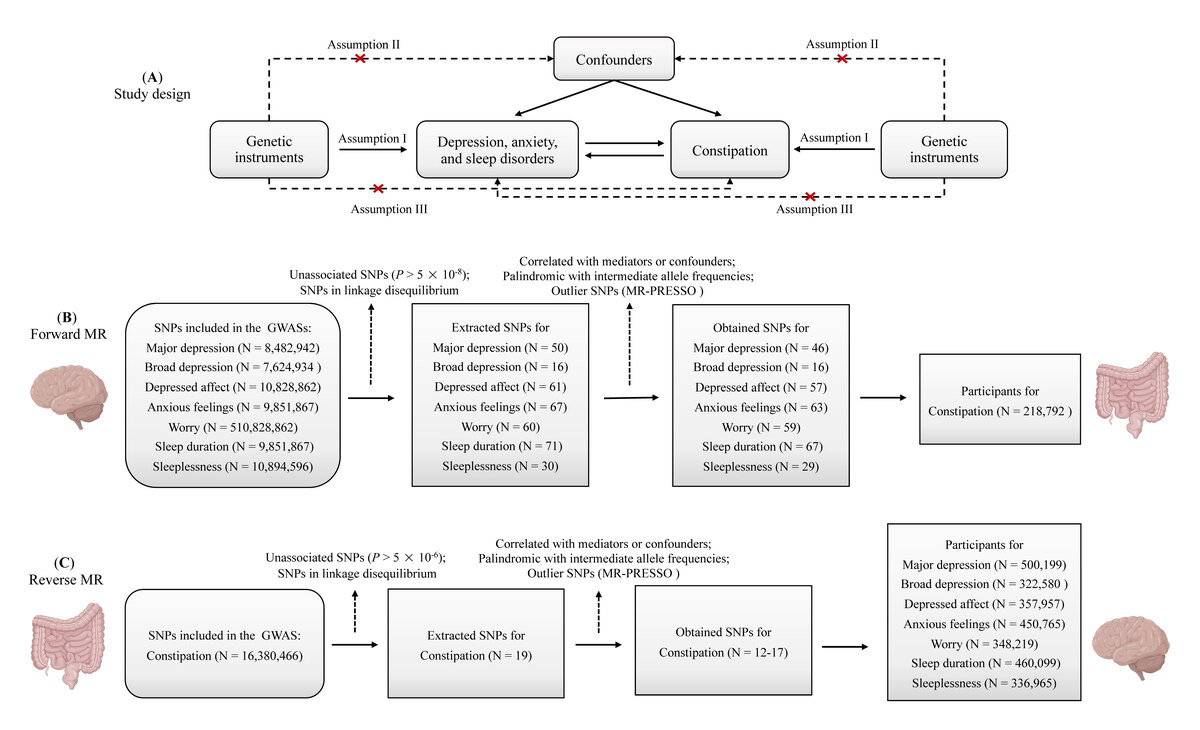Current issue
Archive
Manuscripts accepted
About the Journal
Editorial office
Editorial board
Section Editors
Abstracting and indexing
Subscription
Contact
Ethical standards and procedures
Most read articles
Instructions for authors
Article Processing Charge (APC)
Regulations of paying article processing charge (APC)
GASTROENTEROLOGY / RESEARCH PAPER
Bidirectional Associations of Depression, Anxiety, Sleep Disorders, and Constipation: Insights from Mendelian Randomization
1
, China
Submission date: 2025-03-23
Final revision date: 2025-06-15
Acceptance date: 2025-06-27
Online publication date: 2025-07-02
Corresponding author
Xinchao Chen
The School of Clinical Medicine, Fujian Medical University; Department of Psychiatry, Xiamen Xianyue Hospital, Xianyue Hospital Affiliated with Xiamen Medical College, Fujian Psychiatric Center, Fujian Clinical Research Center for Mental Disorders, 361012, Xiamen, China
The School of Clinical Medicine, Fujian Medical University; Department of Psychiatry, Xiamen Xianyue Hospital, Xianyue Hospital Affiliated with Xiamen Medical College, Fujian Psychiatric Center, Fujian Clinical Research Center for Mental Disorders, 361012, Xiamen, China
KEYWORDS
TOPICS
ABSTRACT
Introduction:
Mental health disorders and constipation are worldwide and increasingly prevalent health problems. Previous studies have reported bidirectional associations between depression, anxiety, sleep disorders, and constipation. However, the existing observational studies yielded inconsistent results.
Material and methods:
The associations were examined through a two-sample, bidirectional, univariable, and multivariable Mendelian randomization (MR) study. Summary-level data were obtained from the UK Biobank, large consortia, and the FinnGen consortium. The inverse-variance weighted method was applied as the principal analytical approach, and other additional MR methods (maximum likelihood, MR-RAPS, and MR-PRESSO) were used for sensitivity analyses. Multivariable MR analysis was performed to assess the independent effects of selected exposures.
Results:
The univariable MR analyses indicated that major depression (MD) (OR,1.28; 95% CI, 1.12-1.46), broad depression (BD) (OR, 3.72; 95% CI, 1.55-8.97), depressed affect (OR, 1.41; 95% CI, 1.13-1.76), and worry (OR, 1.42; 95% CI, 1.13-1.77) were associated with an increased risk of constipation. There was no evidence supporting the causal effects of anxious feelings, sleep duration, and sleeplessness on constipation. The reverse MR analyses found no reverse causal association of constipation with depression, anxiety, and sleep disorders. In Multivariable MR, only MD still had a robust causal association with constipation, while the effect of worry was attenuated to null, and the effects of BD and depressed affect were completely reversed.
Conclusions:
MD is causally associated with constipation, and worry might also increase the risk of constipation. Future studies are needed to confirm the causality and elucidate the underlying mechanisms.
Mental health disorders and constipation are worldwide and increasingly prevalent health problems. Previous studies have reported bidirectional associations between depression, anxiety, sleep disorders, and constipation. However, the existing observational studies yielded inconsistent results.
Material and methods:
The associations were examined through a two-sample, bidirectional, univariable, and multivariable Mendelian randomization (MR) study. Summary-level data were obtained from the UK Biobank, large consortia, and the FinnGen consortium. The inverse-variance weighted method was applied as the principal analytical approach, and other additional MR methods (maximum likelihood, MR-RAPS, and MR-PRESSO) were used for sensitivity analyses. Multivariable MR analysis was performed to assess the independent effects of selected exposures.
Results:
The univariable MR analyses indicated that major depression (MD) (OR,1.28; 95% CI, 1.12-1.46), broad depression (BD) (OR, 3.72; 95% CI, 1.55-8.97), depressed affect (OR, 1.41; 95% CI, 1.13-1.76), and worry (OR, 1.42; 95% CI, 1.13-1.77) were associated with an increased risk of constipation. There was no evidence supporting the causal effects of anxious feelings, sleep duration, and sleeplessness on constipation. The reverse MR analyses found no reverse causal association of constipation with depression, anxiety, and sleep disorders. In Multivariable MR, only MD still had a robust causal association with constipation, while the effect of worry was attenuated to null, and the effects of BD and depressed affect were completely reversed.
Conclusions:
MD is causally associated with constipation, and worry might also increase the risk of constipation. Future studies are needed to confirm the causality and elucidate the underlying mechanisms.
Share
RELATED ARTICLE
We process personal data collected when visiting the website. The function of obtaining information about users and their behavior is carried out by voluntarily entered information in forms and saving cookies in end devices. Data, including cookies, are used to provide services, improve the user experience and to analyze the traffic in accordance with the Privacy policy. Data are also collected and processed by Google Analytics tool (more).
You can change cookies settings in your browser. Restricted use of cookies in the browser configuration may affect some functionalities of the website.
You can change cookies settings in your browser. Restricted use of cookies in the browser configuration may affect some functionalities of the website.



